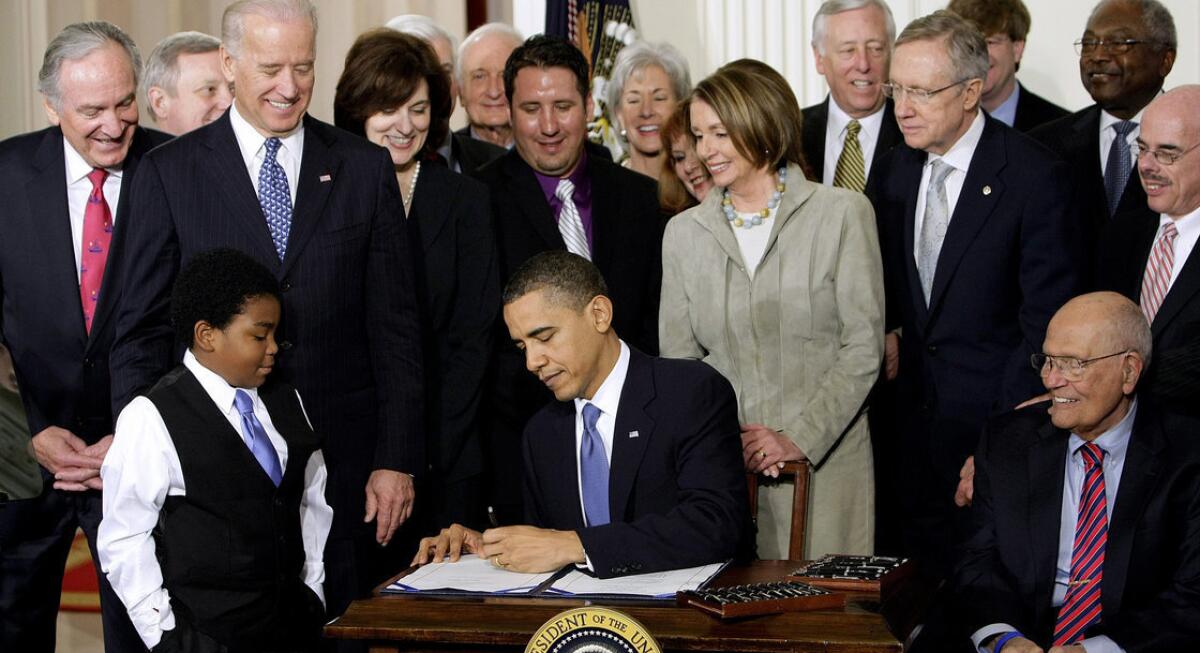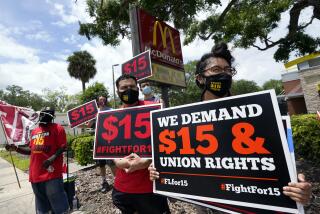Should we kill Obamacare’s employer mandate?

- Share via
As complaints and cavils about the Affordable Care Act fall by the wayside, one piece of the law looms ever larger as its most controversial element: the employer mandate, which in 2016 will impose a penalty on businesses with 50 to 99 employees for not offering them health coverage.
The employer mandate is the focus of anti-ACA militancy by business groups. These critics now have been given ammunition by a middle-of-the-road think tank, which found in an analysis published last week that eliminating the mandate would have little effect on employer-based coverage, would “eliminate labor market distortions in the law,” and might even quell some of the political opposition.
The think tank is the Urban Institute, which published its report through the Robert Wood Johnson Foundation, a credible backer of healthcare studies. With other provisions of the Affordable Care Act taking hold, the time may have come to consider lifting the employer mandate. As for whether that will reduce political opposition to Obamacare, however, our feeling is: dream on. Critics of the act are driven less by the sort of sober analysis produced by the Urban Institute, and more by crass partisan calculation.
Indeed, if not for partisanship in Washington, there’s a chance that the employer mandate would have been revised or repealed long ago. It has always been questioned by a broad spectrum of economists, who are uneasy about its labor market effects.
Put simply, if you impose a penalty on businesses that kicks in at 50 employees, 30 hours per employee, or at a given wage per employee, you’re encouraging businesses to keep their payrolls below 50 workers, hours at 29 per week, and wages below the threshold. (For businesses with 100 workers or more, the mandate starts in 2015.) The Urban Institute points out that these are almost never bright lines, because businesses have lots of reasons--including efficiency and reduced turnover--to increase staff, keep worker hours stable, and pay higher wages than merely the prospect of avoiding a healthcare tax.
Moreover, there’s always a certain measure of cynicism in politicians’ complaints about employment effects on the margins. That’s because every government program, mandate, or benefit involves a margin at which rules appear, disappear, or change--tax rates, Social Security stipends, you name it. To paraphrase Bernard Shaw, usually we’re not arguing about the mandate itself, just the price.
The key assertion of the Urban Institute study is that eliminating the employer mandate won’t significantly affect the number of Americans with health insurance. Most big employers already offer their workers adequate health plans, and they’re almost certain to keep doing so to meet the needs and desires of their employees and recruit new ones.
Regarding the others, the study asserts that “employers with 50 or more workers not offering coverage pre-ACA are the same employers that are highly likely to not offer in the future.” In other words, the penalty won’t sway them either way. The study estimates that 251.1 million Americans will have health coverage in 2016 if the employer mandate stays, and 250.9 million will have coverage if it’s dropped.
Still, there are a couple of reasons to be cautious about repealing the mandate. One is identified by the Urban Institute: by eliminating the government’s take from employer penalties and the larger expenses for government subsidies for employees left uncovered, the repeal would open a hole in the financing of the ACA that would need to be filled. The Congressional Budget Office has estimated that gap at $140 billion through 2023; the Urban Institute places it much lower, at about $46 billion.
The other reason for caution is that the study is based on the assumption that most employers won’t change their health coverage, with or without the mandate. Can we be sure of that? The recent history of workforce compensation and benefits suggests that employers will take advantage of every opportunity to pare employee compensation--that’s a major contributor to income inequality.
Already, many employers are cutting healthcare benefits and blaming Obamacare, even though the provisions that affect them won’t be activated for another year or more. Removing a provision that limits this impulse may be risky for employee health.
These effects would be proper topics for legislative study and careful action. We don’t live in a world where that takes place. If only the critics of Obamacare could shed their wild-eyed claims about the law and turn to fixing what needs to be fixed. If only.
More to Read
Inside the business of entertainment
The Wide Shot brings you news, analysis and insights on everything from streaming wars to production — and what it all means for the future.
You may occasionally receive promotional content from the Los Angeles Times.











